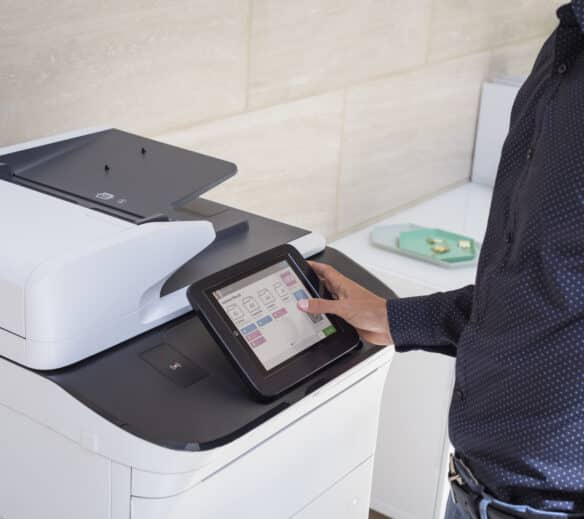
DPD CONSOLIDATES ITS PRINTER FLEET TO ACHIEVE GREATER ENERGY AND COST EFFECIENCES
Owned by France’s La Poste, DPD UK provides express parcel delivery services to customers throughout the UK. The company is committed to being the UK’s most sustainable delivery company, with a commitment to deliver all-electric in 25 UK cities by 2025.
-
Industry
Distribution and logisticsObjective
Audit and consolidate printer estate and introduce a managed service across more than 150 printers across 100 sitesIT matters
Conduct estate-wide printer fleet audit, replace, consolidate, and re-purpose printer fleet as necessary based on audit data and introduce managed service for continuous device monitoring and maintenance. -
Approach
Migration of third-party managed print service responsibility to DTPBusiness matters
Ensure printer estate is energy efficient, cost effective and secure, free up internal resources to focus on business-critical activities and scale managed service and support as the business grows.
A PRINTER ESTATE TO SUPPORT RAPID BUSINESS GROWTH
Handling more than 260 million parcels a year and with 84 depots, DPD is one of Europe’s leading parcel delivery groups. With a large number of sites in the UK, each one with its own operations team dealing with everything from invoicing to driver contracts and timesheets, DPD manages and maintains a large multifunction printer fleet. But with two separate managed print service (MPS) vendors to deal with, DPD found it increasingly difficult to perform even the simplest update tasks without consuming significant time and resources.
What’s more, the IT team were working towards ISO27001 certification, part of the company’s dedication to data security. So, while there were no immediate security concerns, the team was aware that much of its printer fleet needed significant firmware updates. Add to this DPD’s focus on environmental sustainability and cost-efficiency, the company needed a way to rationalise its printer fleet to ensure it was optimised in line with the company’s growth ambitions – including its commitments to carbon neutrality.
USING DATA TO DRIVE EFFECTIVE DECISION MAKING
Building on the company’s existing relationship with DTP, DPD gave the go-ahead to conduct an estate-wide audit of its printer fleet, producing a comprehensive device report which both teams worked through to create a plan of action.
As the company had expanded over the years, so had its printer fleet, bloating its estate with devices that were seldom used. Off the back of the audit report, both teams identified several devices which could be sold on or recycled, reducing the number of printers to manage and their associated overheads.
Any new printers which were required to replace old models were selected based on energy efficiency and cost-effectiveness, a decision that DPD made in line with its commitment to environmental sustainability and lean operations. New devices now benefit from HP PageWide technology for increased print quality and performance.

-
MANAGED SERVICES BUILT FOR SCALABILITY
While DPD was already using DTP Managed Print Services – including HP JetAdvantage Security Manager – across some of its printer fleet, Rahil and the team were keen to take advantage of these services across the entire estate.
DPD also needed to update its SafeCom print management solution and migrate it to new infrastructure. “Our SafeCom environment hadn’t been updated for a while, and committing significant resources to it wasn’t a realistic option,” says Rahil. “DTP took control of SafeCom across the estate, updating it to the latest version and migrating it to a new, fit-for-purpose server. It’s greatly reduced our overheads.”
A consolidated printer estate that’s cheaper to run and better for the environment. “DTP’s communication with us throughout the process was excellent,” says Rahil. “Our expectations were met at every stage and it was clear we were in safe hands. What’s more, DTP‘s ‘fix before failure’ approach to managed services completely aligns with our way of thinking. They hold both themselves and us to account with high standards and integrity.”
-
Overall, cost has been one of the biggest benefits for DPD. By consolidating its printer fleet alone, the company has improved estate running costs by nearly 20%. DPD now also benefits from a more lean, efficient – and above all – reliable fleet, capable of supporting its continued growth.
And by using DTP Transparent Managed Print Services (TMPS), consumables procurement is subject to greater scrutiny. For example, with a previous supplier, sites could put in requests for new toner as and when they needed it, without any pushback from the service provider. Now, new toner can only be ordered when it’s absolutely necessary, preventing localised stockpiling. It’s another area where data is helping drive better commercial decisions.
But the benefits go far beyond spreadsheet financials. In addition to the environmental sustainability advantages the project has brought, DPD’s internal teams also stand to benefit from the changes.
“Consolidating our printer fleet has created significant efficiency savings not just in my IT team, but right across the business,” says Rahil. “As an IT manager, I’m able to provide a better, more reliable service for internal stakeholders, at the best rates for the business”.
DPD has a motto for its staff: treat the company’s resources as you would your own. Rahil believes that by moving to a single MPS supplier to manage its entire printer estate, he’s better equipped to make good on this mantra: “We demand high-quality work from our suppliers. I really like the way DTP maintains its standards with integrity, it’s completely in-line with our own philosophy”.


